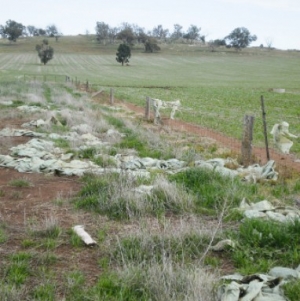The way farms and rural businesses deal with waste is the focus of a study being done for Environment Canterbury.
Canterbury has nearly 9000 farms, but to date there is little available data on how the sector manages non-natural waste. Environment Canterbury will be one of the first regional councils to review the issue and to work with farmers to find long-term solutions to dealing with their waste more sustainably.
Project Manager Isla Hepburn says while there are several successful rural product stewardship schemes collecting wastes such as farm plastics and chemicals, uptake across the region is generally low, which raises concerns about future legacy issues. Also, as overseas buyers call for evidence that New Zealand has environmentally sustainable practices, focus will undoubtedly fall on rural waste disposal measures.
Non-natural rural waste (NNRW) results from rural production activities and includes wastes such as scrap metal, treated timber and fence posts, agrichemicals, plastic wraps and ties, crop netting, glass, batteries, construction and demolition wastes and domestic refuse.
If managed inappropriately, non-natural rural waste has the potential to adversely affect the environment, our drinking water, human and animal health, productivity of rural industries, and land value.
Environment Canterbury has been working in partnership with a number of industry groups and organisations to understand the current management of rural waste. To this end, it has contracted environmental consultants GHD to undertake a survey of Canterbury farms to find out what type of wastes are produced and where they are going.
The project, which is jointly funded by the Canterbury Waste Joint Committee and Environment Canterbury, will involve a consultant visiting 50 or more farms across the region, as well as identifying the types of waste management services available in each area. An online survey will also take place.
"We really want to engage with farmers, rural communities and industry groups to explore the issue. Collaboration is the key for us. This project is a good opportunity to gather data about waste streams, assess the volumes generated on farms and find out about current methods of disposal. Individual farms will not be named in the research.
"We are asking farmers to help us to look at the issue because we want to know what the current situation is in order for us all to manage it effectively and find better solutions for the future.''
The information collected will help to inform policy and planning and will provide an accurate picture of the effectiveness of current rural waste services in Canterbury.
Farmers have traditionally used burning, burying and bulk storing as a means of dealing with rural waste, resulting in significant tonnages of waste being stockpiled, burnt and landfilled on farms. District councils have also raised concerns about these methods of disposal, especially burning.
"Regional Councils across the country work to reduce negative impacts on our land, water and air and ways of improving sustainable practices are always being looked at,'' says Ms Hepburn. "Current methods of disposal are not viable in the long-term so we are looking at what alternative services will be needed and how we can extend existing ones. Existing product stewardship programmes are already in place and the research should provide more information on ways of extending farmer involvement in these programmes.''
Farm visits will take place during March and a full report on the research should be available by the end of June.
To get involved with the project or to find out more, contact Environment Canterbury Project Manager, Isla Hepburn on 3653 828



















